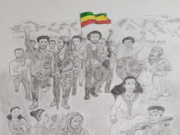Is the Ethiopian War Saga Ending, or Just
Beginning?
By Gregory R. Copley
Ethiopian Prime Minister Dr Abiy Ahmed Ali was, by mid-August 2024, isolated. The civil war he had waged against the dissident Tigré Popular Liberation Front (TPLF) was won in late 2022, but the war he then began against the Amhara people — a much larger Ethiopian ethnic group — has proven a disaster for him.
By early August 2024, the three Amhara Fano militia groups had agreed on a common military leadership structure. They had absorbed the defection of three major units from the Ethiopian National Defense Force — possibly at division size — along with their commanding generals who had tired of Prime Minister Abiy’s “divide and conquer” policies.
At that point, the Fano groups, which also had the reported support of neighboring Eritrea, outnumbered the Government forces, and probably had better equipment than the Government, except in the area of medium-sized unmanned combat aerial vehicles (UCAVs). The Bayraktar-2 UCAVs in the Ethiopian inventory were helpful against the soft-skinned convoys of the TPLF but have been less than effective against the Fano.
Prime Minister Abiy was more-or-less isolated in Addis Ababa, disregarding advice from his senior military and political advisors. What has been described as a messianic quality of Dr Abiy ensured that he had frustrated many of his key advisors, who ultimately had abandoned him.
His recent decision to embrace the neighboring (but unrecognized) Republic of Somaliland, and to give it a stake in Ethiopia’s greatest asset, Ethiopian Airways, backfired, and turned not only Somalia (and its supporter, Türkiye) against him, but also caused Djibouti, once a part of Ethiopia, to cool its relations with Addis Ababa. Dr Abiy has subsequently backed off this “deal” with Somaliland, even though Somaliland, with its access to the Red Sea through the port of Berbera, is important strategically for Ethiopia.
The question was being openly asked in early August 2024, in Addis Ababa: “When will Abiy quietly slip away and fly into a comfortable exile?” And where could he find refuge? Possibly Saudi Arabia or the United Arab Emirates (UAE), even though Dr Abiy is a Pentacostalist Christian, not a Muslim. In the meantime, though, Dr Abiy’s Government is broke, and is resorting to attempting to extract cash directly from the bank accounts of locals.
Going forward, the TPLF remains a factor, even though the defeated communist force represents only a minority of the Tigrean people, who comprise only six percent of the Ethiopian population. The US Biden Administration continues to support the TPLF, just as its predecessor Obama Administration funded, armed, and trained the TPLF when the group was in power in Ethiopia. It is probable that the US Government would continue to support the TPLF if current US Vice-Pres. Kamala Harris was to be elected President in the November 5, 2024, elections. And there is an entrenched group within the US State Dept. which would continue to support the TPLF even if former US Pres. Donald Trump was to win re-election.
A significant uncertainty, however, is how would the Fano group(s) act if they forced Abiy from power, or if he left and created a vacuum. The Fano groups basically want to see a restoration of Ethiopian unity, but essentially they want it to be under Amhara leadership. And unless this approach was modified to allow leadership to be shared with others in the 80-ethnicity Ethiopian state, it would be unlikely to be accepted.
And the Amhara leadership, presumably emerging with the Fano, would need particularly to seek a rapprochement with the Tigreans and even the extremist TPLF. A unity-oriented government would win widespread support, but the dominant ethnic group, the Oromo, would still throw up extremists of their own (as they have done for decades) in the form of the Oromo Liberation Front (OLF) and its related bodies.
So far, none of the Fano leaders have given any indication of possible national policies they might favor, although there is a general indication that they favor the restoration of the monarchy. Their first step, in all likelihood, however, is to gain complete control of the Amhara region, as Abiy appointees in the regional government are leaving or defecting. Can Abiy hold power long enough for the Amhara to consolidate their home base? Even Abiy’s powerbase, the Oromo population, is moving against him.
Published with Permission from Defense & foreign Affairs Special Analysis Journal



























